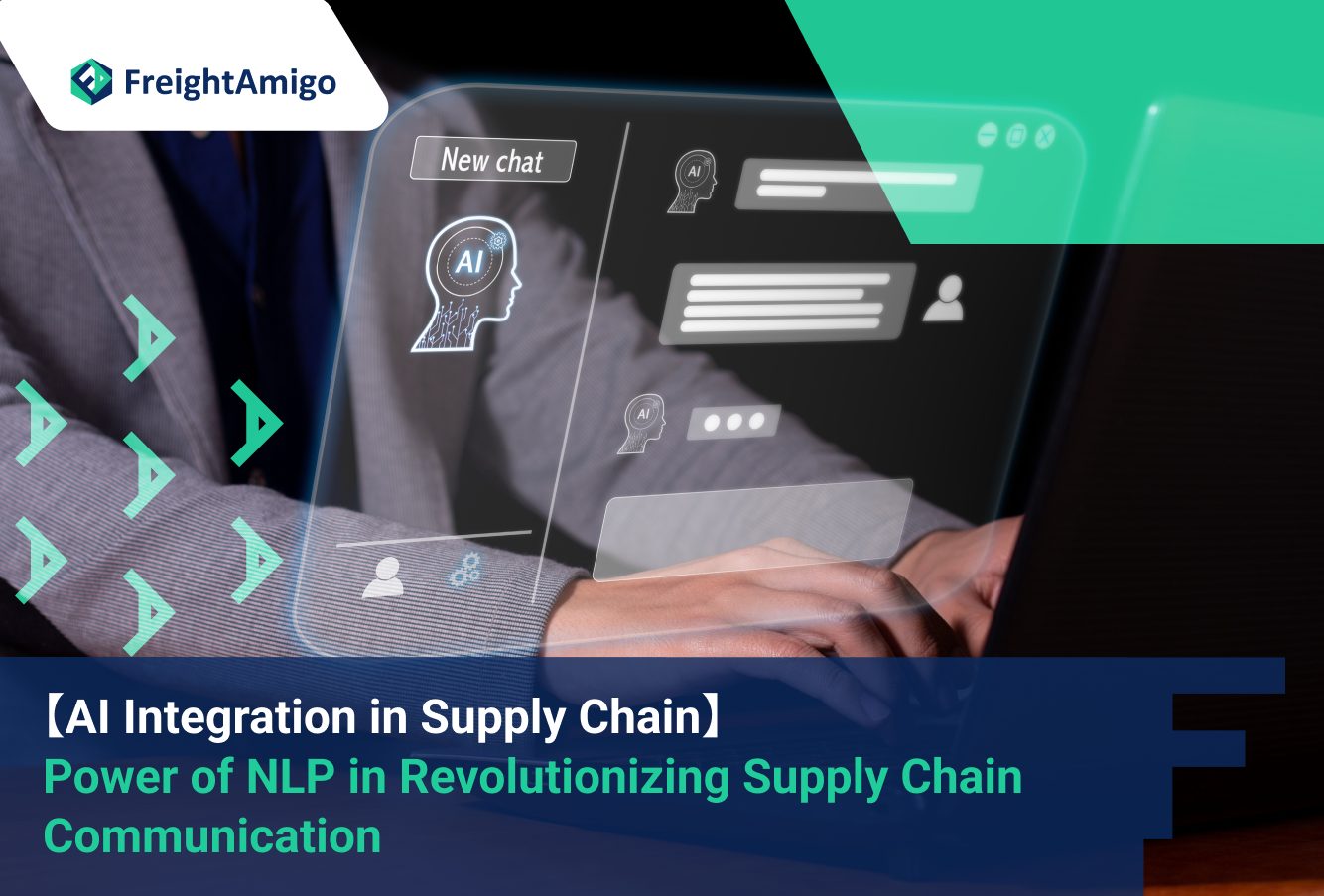The global supply chain industry has been undergoing a significant transformation in recent years, driven by technological advancements. One such technology that is revolutionizing supply chain communication is Natural Language Processing (NLP). This cutting-edge domain of artificial intelligence (AI) and machine learning (ML) enables computers to analyze, understand, and derive meaning from human language. By harnessing the power of NLP, supply chain organizations can streamline their operations, enhance efficiency, and deliver a superior customer experience.
Latest update on 26 January, 2024 by Aurora Park– Marketing Analyst at FreightAmigo
Want To Compare The Best Express, Air Freight, Sea Freight, Rail Freight & Trucking Rates So As To Have Better Control On Cost?
Evolution of NLP in Supply Chain Communication
Over the years, the application of NLP in supply chain communication has evolved, enabling organizations to overcome challenges and optimize their processes. Initially, large enterprises like UPS and FedEx pioneered the use of NLP in tracking packages through voice-activated systems. Customers could simply provide their tracking numbers verbally and receive real-time updates on their shipments. This early adoption of NLP laid the foundation for further advancements in supply chain communication.
With the advent of cloud computing and services like Google Cloud NLP and IBM Watson, the power of NLP became more accessible to a broader range of organizations. Today, NLP is being utilized in various applications within the supply chain, from customer service chatbots to document automation and real-time monitoring. The capabilities of NLP continue to expand, providing unprecedented opportunities for supply chain organizations to optimize their communication processes.
Enhancing Customer Service with NLP
One of the key areas where NLP is making a significant impact in supply chain communication is customer service. NLP-enabled chatbots are transforming the way organizations interact with their customers, providing timely and accurate information while reducing the burden on human resources. These chatbots can handle common queries, such as tracking shipments, estimating delivery times, and resolving customer issues. By automating these tasks, organizations can improve response times, enhance customer satisfaction, and allocate their human resources to more complex and strategic activities.
Streamlining Document Automation
In the logistics industry, the processing of various documents is both critical and time-consuming. NLP plays a vital role in automating document processing, enabling organizations to extract valuable information from invoices, shipping labels, customs forms, and more. By leveraging NLP algorithms, these documents can be read and interpreted, even if they are in different languages or formats. This automation not only saves time but also reduces the risk of human error, ensuring accurate and efficient data management.
Real-Time Monitoring and Alerting
One of the most powerful applications of NLP in supply chain communication is real-time monitoring and alerting. Advanced NLP systems can analyze textual data from diverse sources such as emails, social media, news outlets, and public records to generate real-time alerts about potential disruptions in logistics operations. These alerts can notify organizations about strikes, road closures, natural disasters, or any other events that could impact the supply chain. By proactively addressing these issues, organizations can mitigate risks, minimize delays, and ensure smooth operations.
Unleashing the Power of Data Labeling
Data labeling plays a crucial role in creating custom NLP models that cater specifically to the needs of supply chain organizations. By labeling data, organizations can train their models to understand and recognize patterns in supply chain communication. This labeled data forms the foundation for language modeling, tokenization, text classification, sentiment analysis, named entity recognition, and other components of NLP. The accuracy and effectiveness of NLP models depend on the quality of labeled data, making data labeling a critical step in harnessing the full potential of NLP in supply chain communication.
Language Modeling and Tokenization
Language modeling and tokenization are fundamental components of NLP that enable computers to understand and process human language. Language models, often created using deep learning techniques, are trained on vast datasets that include industry-specific documentation, text, or speech. Tokenization breaks down sentences into smaller units, such as words or sub-words, known as ‘tokens.’ In the context of supply chain communication, tokenization allows NLP systems to comprehend terms like “ETA” (Estimated Time of Arrival) or “POD” (Proof of Delivery), which are crucial for optimizing operations such as route optimization and shipment tracking.
Text Classification and Sentiment Analysis
Text classification and sentiment analysis are essential for categorizing and understanding the emotional tone of textual data. Text classification involves assigning incoming text data into predefined classes, such as ‘Invoice Query,’ ‘Shipment Update,’ or ‘Customer Complaint.’ Sentiment analysis, on the other hand, gauges the emotional sentiment behind text data, providing insights into customer satisfaction or dissatisfaction. These NLP techniques are particularly useful in customer service applications, enabling organizations to respond appropriately to customer inquiries and feedback.
Named Entity Recognition for Precise Terminology
In supply chain communication, precise terminology is crucial for accurate understanding and effective decision-making. Named Entity Recognition (NER) is a specialized NLP task that identifies specific entities in a string of text, such as names, time, geographic locations, or logistics terms like ‘SKU’ or ‘Tracking Number.’ By employing NER, organizations can automate the processing of customs documentation, identify key information in contracts, or extract relevant data from supplier agreements. NER ensures that important information is not overlooked, streamlining communication and reducing manual effort.
Information Extraction and Text Mining
Information extraction and text mining enable organizations to derive valuable insights and patterns from unstructured textual data. Information extraction involves automatically extracting useful information and relationships from documents, while text mining aims to discover new insights and patterns within text data. In the context of the supply chain, these NLP techniques can be applied to analyze shipping labels, contracts, or supplier agreements, helping organizations optimize their processes, identify trends, and make data-driven decisions.
Conversational Interfaces and Chatbots
Conversational interfaces, such as chatbots, are highly visible applications of NLP in supply chain communication. These chatbots can interpret natural language queries and engage in conversations with customers or logistics partners. By leveraging NLP, chatbots can provide quick and efficient assistance with order tracking, scheduling, and issue resolution. Chatbots enhance the customer experience by offering personalized and real-time support, reducing the need for human intervention, and ensuring consistent and accurate communication throughout the supply chain.
Translation and Multilingual Support
In the era of global supply chains, language barriers can hinder effective communication and collaboration. NLP systems with multilingual capabilities can automatically translate incoming queries or documents, breaking down language barriers and facilitating seamless operations. For organizations with suppliers, warehouses, and customers across different countries, multilingual NLP enables efficient communication, ensuring accurate understanding and consistent information flow.
The Integration of AI in Supply Chain Communication
As the supply chain industry continues to embrace digital transformation, the integration of AI technologies, including NLP, is becoming increasingly important. AI-driven systems can analyze vast amounts of data, extract meaningful insights, and automate processes, leading to improved efficiency, cost savings, and enhanced customer satisfaction. By leveraging AI and NLP, supply chain organizations can unlock new opportunities, optimize their operations, and stay ahead in today’s fast-paced and competitive business landscape.
Conclusion
Natural Language Processing has emerged as a game-changer in supply chain communication, empowering organizations to streamline processes, enhance customer service, and mitigate risks. From automating document processing to real-time monitoring and chatbot-based customer support, NLP is revolutionizing the way supply chain organizations communicate and operate. By harnessing the power of NLP and embracing AI integration, supply chain organizations can unlock new levels of efficiency, agility, and customer-centricity, positioning themselves as leaders in the rapidly evolving global marketplace. As the supply chain industry continues to evolve, NLP will undoubtedly play a pivotal role in shaping the future of communication and collaboration.
There Are Different Options For Cargo Transportation. If You Want To Choose The Most Convenient And Suitable Solution, It Is Best To Have The Full Support Of Logistics Experts! If You Are Planning To Ship Goods Overseas, Please Go To The FreightAmigo Page For Inquiries.
Read More:
【AI Integration in Supply Chain】 Revolutionizing Last-Mile Delivery
【AI Integration in Supply Chain】 Revolutionizing Supplier Relationship Management
【Logistics101】The Impact of Artificial Intelligence in Logistics Automation
If you have any inquiries on logistics/supply chain, feel free to contact FreightAmigo now:
Chat with us online | Hotline: +852 28121686 | WhatsApp: +852 27467829









































